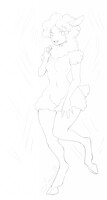
I remember that one late August night,
Watching the moths mob the lantern’s amber
Light, the summer wind playing with the flame,
Your ebon hair, swaying, caressed your neck.
I saw you swallow. I envied your spit.
You looked upward to the wild country sky,
The wide universe’s starshine echoed
In hazel eyes, not mine, Oh Lord, not mine.
I stop to wipe my eighty-proof tears, and
Check my pockets for the past twenty years.
How strange, the one thing that’s still the same:
Your name inscribed on this old paper heart,
But apart from that, I’ve got nothing but change.
That’s good, you know. So maybe I’ll let go.
A shining rain falls down to the stones,
And I can’t believe all the things I’ve done.
Silver lights shimmer in the wishing well,
Striving to become myself
Without you.
Watching the moths mob the lantern’s amber
Light, the summer wind playing with the flame,
Your ebon hair, swaying, caressed your neck.
I saw you swallow. I envied your spit.
You looked upward to the wild country sky,
The wide universe’s starshine echoed
In hazel eyes, not mine, Oh Lord, not mine.
I stop to wipe my eighty-proof tears, and
Check my pockets for the past twenty years.
How strange, the one thing that’s still the same:
Your name inscribed on this old paper heart,
But apart from that, I’ve got nothing but change.
That’s good, you know. So maybe I’ll let go.
A shining rain falls down to the stones,
And I can’t believe all the things I’ve done.
Silver lights shimmer in the wishing well,
Striving to become myself
Without you.
Category Poetry / All
Species Unspecified / Any
Size 50 x 50px
File Size 45.1 kB
I’d like to start by saying that this poem has strong imagery. What makes it strong isn’t any flashy adjectives or obtuse nouns. Rather, its strength lies in its cleverness of comparison. I’ll explain this more as I address what I liked about the poem, one stanza at a time.
Stanza 1: It starts off simple: I remember that one August night. It’s clear. It is a good first line that knows what it’s supposed to do and doesn’t try to do too much. I like simplicity in my poems. I like a simple opening. I know this is just my preference but I appreciate your poem all the more for it, all the same. Anyway, from the look of the poem alone, with nearly uniform line lengths, I expected meter, maybe rhyme. I got neither. Instead, we get heavy enjambment in the second line that falls away into the first word of the third line, “light” which rhymes with “night”, the ending of the first. But this is one word too late to make the first two lines a rhyming couplet and so there is this sense of near perfection, but not quite, already rekindling, through the use of the enjambment, the notion that we are in a memory and memories are never perfect, as was the rhyme. Next we have several lines of description, scene setting, a dark comforting blanket of imagery that leads us to the drop.
By this, I mean the fifth line which, in my opinion, is the most important line in the first stanza. The first four lines make one flowing, poetic, filibuster of a sentence. It is a drawn out sentence. We are swayed into the comfort of a reminiscent summer night lull. And then the fifth line falls. Two sentences in one line. Four words each. They are jarring. Not only because of their physical look on the page but because we now turn to more human and somewhat basal observations. Swallowing isn’t the most poetic of images. And who envies spit? This clues us in to the fact that something is wrong. This line directly calls to a more physical yearning. It grounds us with the realization that something is amiss, something will go wrong because it is only in loss or hardship that we come to appreciate the little details of things, that we come to appreciate, say, the act of swallowing. Next, the person in the memory is gazing upward into the “wild country sky” (a phrasing I really like, by the way), and we have the reflection of light into the eyes of the person in the memory, but not the speaker. This further surfaces the idea of separation. You have the stars in your eyes and I don’t. Then the final repetition of “mine”. This serves two functions. First, it reinforces the idea that something bad will happen. Or in this case, has happened. That the repetition is born of regret. Something which has been dwelt on again and again. There is pleading, Oh Lord, there is pleading. The second function of this repetition is to remind us that this first stanza is a memory and this final line serves to pull us back out of it. It is both concluding the past and setting the tone for the future that we presume to jump into in the next stanza.
Stanza 2: This is the stronger of the two stanzas in my opinion. In the opening line, we are hit over the head with a heavy, drunken metaphor-bottle that puts into context immediately the pretext for the previous stanza: that it is not just a memory, but more accurately, a drunken stumble through the overgrown paths of memory. My favorite line of the poem is the second line. It is sharp. It calls to mind a drunk person checking their pockets after coming to, the morning after, to see what is missing and what is still there. In the case of the poem, they are not checking for keys and wallets but for years. This isn’t the morning after a drunken night - it's the morning after a drunken lifetime. And not actually drunk, but drunk in the sense that their loss was heavy with emotional impairment and melancholic inebriation. The rest of the stanza falls away, confirming the loss, confirming that the loss is “you”, and confirming that the tone of this poem isn’t the sharp sadness of a recent loss but rather the bittersweet longing of a lifetime spent … away. Finally, I am in love with the way you broke the last line into two pieces. In my opinion, the last two lines count as one, and together they are my second favorite line of the entire poem. With them, the poem doesn’t just end. It tapers.
To me, this physical formatting choice is in direct opposition to the message of the last few lines. Here is what I mean by this: A few lines from the end, the narrator reaches for their own version of absolution with the statement “maybe I’ll let go”. They are asserting that they are, perhaps, finally ready to move on. Then, they are next to a wishing well, not just wishing but “striving” to untangle themselves from the memory of “you”. There is a “shining rain” which in many poems alludes to purification, reconciliation. It does here too, I think. So why was I not left with a sense of peace and resolution when I finished reading the poem? Because of the formatting. The last line doesn’t finish strongly, with a bold claim, with imagery of the new, with imagery of the future. Instead, the last line lingers and falls away to the true last line. We are not left with “Striving to become myself” which is a strong, bold, reawakening statement. Instead, what we finish with is “Without you” calling into question everything we have just read in the last half of this stanza. The poem dwells on the “you”. It is physically the last word in the poem. Because the last image is the “you” that the narrator just claimed to let go of, we are left to wonder just how much the narrator is actually willing to let go. And so we finish the poem with uncertainty. There is assurance in the words. There is incertitude in its structure. This is why the last stanza is brilliant to me. Because it simultaneously provides an answer and pulls it away again. It utilizes the physicalness of the words on the page as a tool to strengthen its imagery.
I think your poem is successful because of your clever word choice and deliberate formatting. Thank you for sharing your poem. I was happy to read it. Please let me know if anything I said didn’t make sense and I’d be happy to try to explain it again in a better way. I don’t have a lot of practice yet writing reviews, but I want to get better, so don’t hesitate to tell me I’m not making any sense :P Cheers and have a wonderful day!
Stanza 1: It starts off simple: I remember that one August night. It’s clear. It is a good first line that knows what it’s supposed to do and doesn’t try to do too much. I like simplicity in my poems. I like a simple opening. I know this is just my preference but I appreciate your poem all the more for it, all the same. Anyway, from the look of the poem alone, with nearly uniform line lengths, I expected meter, maybe rhyme. I got neither. Instead, we get heavy enjambment in the second line that falls away into the first word of the third line, “light” which rhymes with “night”, the ending of the first. But this is one word too late to make the first two lines a rhyming couplet and so there is this sense of near perfection, but not quite, already rekindling, through the use of the enjambment, the notion that we are in a memory and memories are never perfect, as was the rhyme. Next we have several lines of description, scene setting, a dark comforting blanket of imagery that leads us to the drop.
By this, I mean the fifth line which, in my opinion, is the most important line in the first stanza. The first four lines make one flowing, poetic, filibuster of a sentence. It is a drawn out sentence. We are swayed into the comfort of a reminiscent summer night lull. And then the fifth line falls. Two sentences in one line. Four words each. They are jarring. Not only because of their physical look on the page but because we now turn to more human and somewhat basal observations. Swallowing isn’t the most poetic of images. And who envies spit? This clues us in to the fact that something is wrong. This line directly calls to a more physical yearning. It grounds us with the realization that something is amiss, something will go wrong because it is only in loss or hardship that we come to appreciate the little details of things, that we come to appreciate, say, the act of swallowing. Next, the person in the memory is gazing upward into the “wild country sky” (a phrasing I really like, by the way), and we have the reflection of light into the eyes of the person in the memory, but not the speaker. This further surfaces the idea of separation. You have the stars in your eyes and I don’t. Then the final repetition of “mine”. This serves two functions. First, it reinforces the idea that something bad will happen. Or in this case, has happened. That the repetition is born of regret. Something which has been dwelt on again and again. There is pleading, Oh Lord, there is pleading. The second function of this repetition is to remind us that this first stanza is a memory and this final line serves to pull us back out of it. It is both concluding the past and setting the tone for the future that we presume to jump into in the next stanza.
Stanza 2: This is the stronger of the two stanzas in my opinion. In the opening line, we are hit over the head with a heavy, drunken metaphor-bottle that puts into context immediately the pretext for the previous stanza: that it is not just a memory, but more accurately, a drunken stumble through the overgrown paths of memory. My favorite line of the poem is the second line. It is sharp. It calls to mind a drunk person checking their pockets after coming to, the morning after, to see what is missing and what is still there. In the case of the poem, they are not checking for keys and wallets but for years. This isn’t the morning after a drunken night - it's the morning after a drunken lifetime. And not actually drunk, but drunk in the sense that their loss was heavy with emotional impairment and melancholic inebriation. The rest of the stanza falls away, confirming the loss, confirming that the loss is “you”, and confirming that the tone of this poem isn’t the sharp sadness of a recent loss but rather the bittersweet longing of a lifetime spent … away. Finally, I am in love with the way you broke the last line into two pieces. In my opinion, the last two lines count as one, and together they are my second favorite line of the entire poem. With them, the poem doesn’t just end. It tapers.
To me, this physical formatting choice is in direct opposition to the message of the last few lines. Here is what I mean by this: A few lines from the end, the narrator reaches for their own version of absolution with the statement “maybe I’ll let go”. They are asserting that they are, perhaps, finally ready to move on. Then, they are next to a wishing well, not just wishing but “striving” to untangle themselves from the memory of “you”. There is a “shining rain” which in many poems alludes to purification, reconciliation. It does here too, I think. So why was I not left with a sense of peace and resolution when I finished reading the poem? Because of the formatting. The last line doesn’t finish strongly, with a bold claim, with imagery of the new, with imagery of the future. Instead, the last line lingers and falls away to the true last line. We are not left with “Striving to become myself” which is a strong, bold, reawakening statement. Instead, what we finish with is “Without you” calling into question everything we have just read in the last half of this stanza. The poem dwells on the “you”. It is physically the last word in the poem. Because the last image is the “you” that the narrator just claimed to let go of, we are left to wonder just how much the narrator is actually willing to let go. And so we finish the poem with uncertainty. There is assurance in the words. There is incertitude in its structure. This is why the last stanza is brilliant to me. Because it simultaneously provides an answer and pulls it away again. It utilizes the physicalness of the words on the page as a tool to strengthen its imagery.
I think your poem is successful because of your clever word choice and deliberate formatting. Thank you for sharing your poem. I was happy to read it. Please let me know if anything I said didn’t make sense and I’d be happy to try to explain it again in a better way. I don’t have a lot of practice yet writing reviews, but I want to get better, so don’t hesitate to tell me I’m not making any sense :P Cheers and have a wonderful day!
Thank you so much. This is one of the nicest things that's happened in all my years of writing. I cried a little.
I'm not the sort of creative who says, "Well, my intent was..." as I feel like that would be denying readers the very ambiguity that makes the interpretation of art interesting in the first place. (I'm also of the school of thought that the opinion of a work's author is no more valid than anyone else's.) But I will say that this is the most thoughtful, detailed analysis of a poem that I have ever received. Thank you, again.
I'm not the sort of creative who says, "Well, my intent was..." as I feel like that would be denying readers the very ambiguity that makes the interpretation of art interesting in the first place. (I'm also of the school of thought that the opinion of a work's author is no more valid than anyone else's.) But I will say that this is the most thoughtful, detailed analysis of a poem that I have ever received. Thank you, again.

 FA+
FA+
!["The Beating Of Wild Hooves" [teaser excerpt]](http://t.furaffinity.net/30791256@200-1552405082.jpg)










Comments